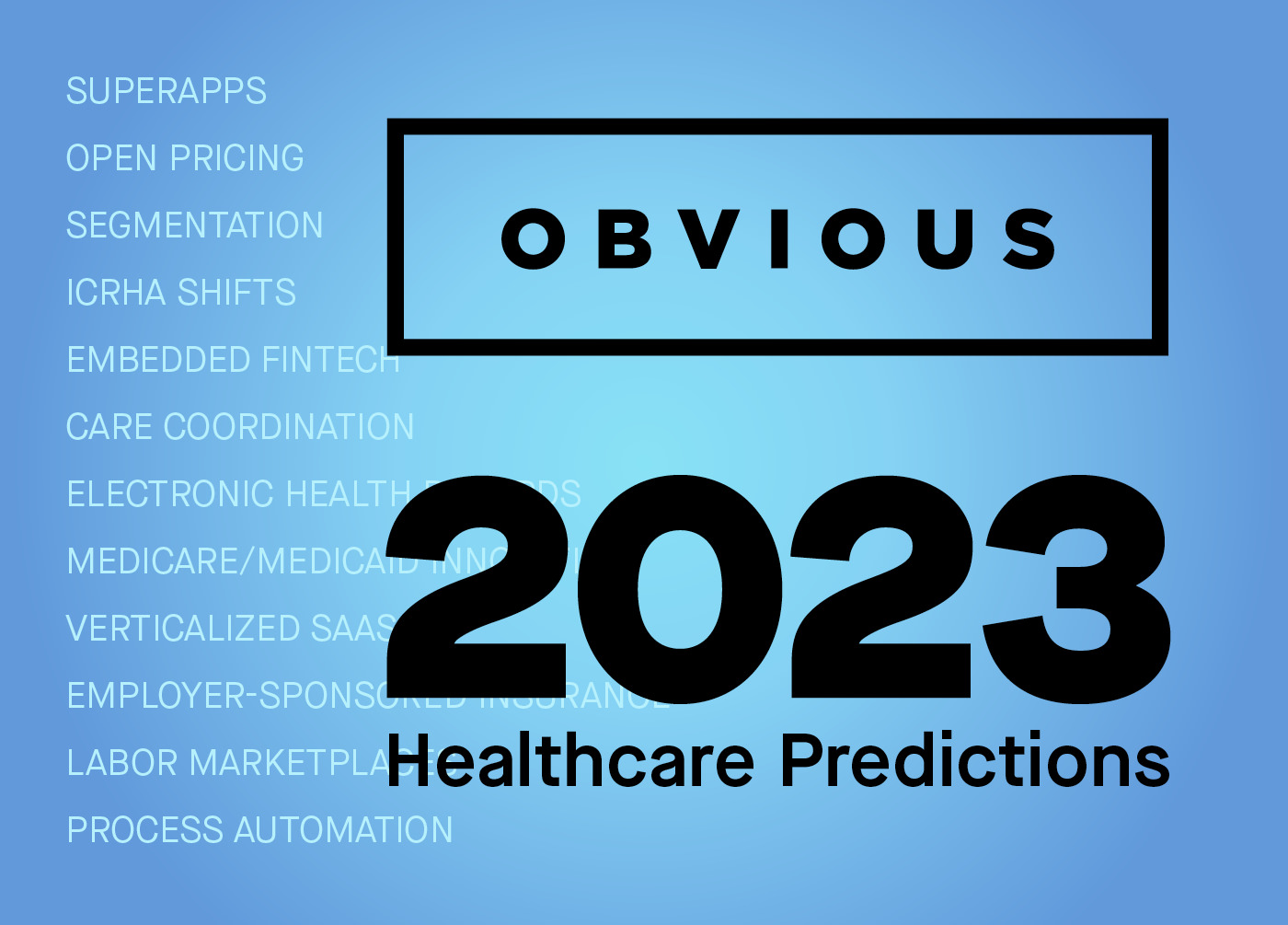10 Healthcare Predictions for 2023
Obvious |

The pandemic ebbed and flowed in 2022. It changed how patients interact with healthcare, strained the finances of health systems, and burned out medical professionals. 2023 will be a year of opportunity to respond to these stressors. Technology and new care models, aided by regulation, will come together to create workable and durable solutions.
Here is what we foresee in the year ahead:
- The SuperApp: New tools are hitting the market to improve every aspect of healthcare, from clinical interventions to coordinating care with specialists. Digitally-enabled Primary Care Providers that help quarterback health, navigate care networks, and take risks for their patients could grow into $500B+ companies and deliver on the promise of value-based care. Picture players like Galileo* becoming a digital door to healthcare at large.
- Modern Infrastructure: The demand for omnichannel care delivery and the need for longitudinal patient records is spurring a technology modernization. We expect home healthcare and value-based care players to be early adopters of this change. Lookout for digital enablement of care in a multichannel setting and longitudinal electronic health record (EHR) companies to make a dent.
- Price Transparency and Payments: The Hospital Price Transparency, Health Plan Price Transparency, and No Surprises acts will spur companies to build products that allow consumers and healthcare workers to make healthcare decisions based on price and quality. Infrastructure to seamlessly schedule appointments with this information, as well as to understand and pay for care, will be built in tandem.
- Tech-Enabled Services Evolution: Expect public market valuations of first-generation tech-enabled services businesses like Teladoc and Hims to stick around ~3x revenue/EV in 2023. Obsession with margins, frictionless access to vetted networks, capital-efficient distribution (via payors or businesses), and demonstration of improved clinical outcomes will determine which next-generation companies scale.
- Segmentation: Healthcare has traditionally been monolithic, but this is going to change. Models tailored to different disease types and demographics are going to help meet the nuanced needs of various segments better than the status quo. We’re bullish about new products that bundle insurance and care delivery networks. Examples include what Progyny did for fertility benefits, what ConcertoCare* is doing for homebound sick and elderly patients, and what Devoted Health* is building for the seniors’ market.
- Medicare Advantage and Managed Medicare:: Almost half of the eligible population is enrolled in Medicare Advantage, slowly phasing out Fee-For-Service Medicare. The Medicare Advantage model has many challenges and will need continuous evolution. Expect regulators to start working on these in 2023. Managed Medicaid will follow the innovation blueprint of Medicare Advantage by leveraging tech-enabled models to bring down the cost of care and improve access.
- Vertical SAAS: B2B SAAS tools with embedded fintech will continue to proliferate as healthcare digitizes to streamline workflows and coordination. Solutions will be tailored to hospitals, independent practices, senior living facilities, nursing homes, payers, and pharma. Cost pressures drive the adoption of software to manage cash flow and improve margins. Be on the lookout for a Ramp or Stripe of Healthcare.
- Employer-Sponsored Insurance: Inflation will continue to raise healthcare insurance premiums. Some employers will pass on the decision (and cost) to employees via Individual Coverage Health Reimbursement Arrangements (ICRHAs). Employers will also move away from point solutions and look for platform solutions that can holistically administer healthcare benefits to their employees that deliver outcomes and reduce costs.
- Marketplaces: In 2023, venture capital dollars will flow to marketplaces, especially B2B and specialized labor marketplaces. In healthcare, these models help coordinate stakeholders, provide easier access and align incentives. Obvious Ventures is a backer of Incredible Health* and Tomorrow Health*, which are success stories in this segment, and we’re excited to partner with more.
- Large Language Models: Administrative costs drive healthcare spend and take valuable time from medical professionals. The pace of quality improvements for Generative AI is at an upward inflection point. Startups can build on existing tools to make them domain-specific and fine tuned for medical note-taking, diagnostics, messaging, billing and coding. A Cohere or Adept built for the healthcare domain is coming.
If you’re equally as excited about what 2023 has in store for healthcare, we’d love to hear from you at vishal@obviousventures.com, kahini@obviousventures.com, and rohan@obviousventures.com.
(* we’ve invested, as a firm)



